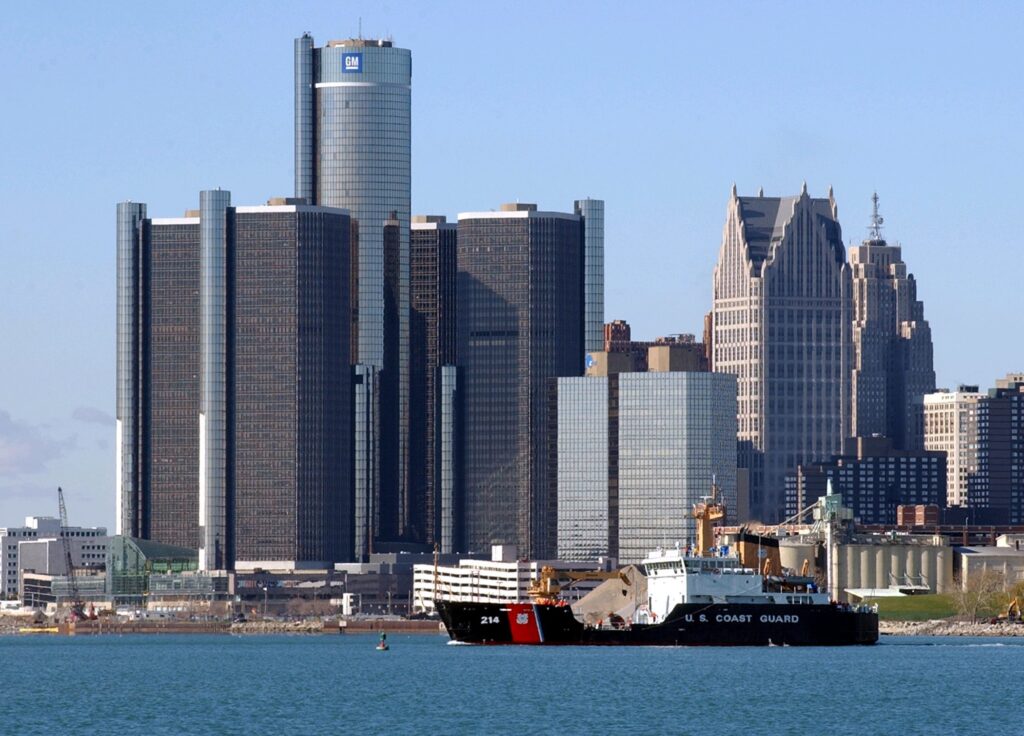Downtown Detroit will soon be under the gaze of 350 surveillance cameras monitored by police, raising privacy concerns among civil libertarians, according to the Detroit News.
The initiative will link new city-installed cameras and existing security cameras belonging to downtown businesses to a central hub operated by the Detroit Police Department. The cameras will be used to observe driver and pedestrian activities, identify criminal suspects, and monitor parking lots and crowds.
According to the Detroit News report, it’s unclear whether surveillance footage would be “kept and archived, or erased in a continuous loop.” The News was able to determine, however, that images taken by the cameras “would be admissible in court if subpoenaed.”
Fixing a Hole
Crime in the Detroit area has surged in 2011. The Detroit News reports “fights, shootings and traffic issues” have occurred near downtown nightclubs, casinos, and restaurants. As of mid-August, there were 227 homicides thus far in 2011 for the entire city of Detroit, up 22.7 percent from the same time in 2010.
Pulitzer Prize-nominated political cartoonist Henry Payne of the Detroit News says the city’s worldwide reputation for violent crime precipitated the surveillance initiative.
“Competing for labor in a national market, Detroit business leaders are desperate to repair the hole in the middle of the Metro Detroit donut,” he said, noting Peter Karmanos’ CompuWare, Michael Ilitch’s Little Caesar’s Pizza, the Red Wings hockey and Tigers baseball teams, Quicken Loans, and General Motors are all headquartered in Detroit. “These entrepreneurs and other corporate titans have invested millions in locating their HQs downtown,” he said.
“But one violent spree at a riverfront concert could forever chill their employees to living nearby,” Payne warned. “Desperate to recreate a new Detroit middle-class tax base, city officials need a symbol to communicate their commitment to safety, with surveillance cameras on every corner.”
Payne continued, “Other urban areas have experienced little cost-benefit from such cameras. But in America’s most violent city, symbolism for now trumps all else.”
‘Additional Image of Safety’
Calls to the Detroit Police Department for this story were not returned. But the News reported Detroit Police Chief Ralph Godbee assured “that the intent is not to invade anyone’s privacy.” The paper added, however, that Godbee “should be on guard against unintentional invasions, and mindful of the great potential for abuse presented by this network of cameras.”
Bob Gregory, senior vice president of the Downtown Detroit Partnership, a consortium of businesses and local government agencies, says the cameras are more for deterring potential crime than for spying on downtown pedestrians.
“I’ve worked in the greater Detroit downtown for 25 years and the core downtown for 10 years,” he said. “We’ve made some strides in ensuring the downtown is a safe place to visit, shop, and work since we hosted the Super Bowl in 2006,” Gregory added. “I think the cameras are more to provide an additional image of safety rather than an acknowledgment that perceptions of rampant crime in the downtown area are realities.”
Gregory noted surveillance cameras are “fairly common” around the world. “It’s not unusual,” he said. “Detroit Police and the city’s business sector have joined forces to keep downtown Detroit safe.”
‘Chain of Custody’
Rebecca Jeschke, media director for the San Francisco-based libertarian Electronic Frontier Foundation, echoes the privacy concerns raised by around-the-clock camera surveillance. “Who knows if the police will create digital dossiers of any person caught on camera?” she asked.
Jeschke also said the Detroit Police Department should divulge how the information taken from the cameras will be handled.
“Whenever law enforcement agencies capture data of any kind, it’s important to identify who has access to the chain of custody,” she said. Failure to disclose such information invites abuses by officers who might intentionally release incriminating images without a subpoena, she notes.
Bruce Edward Walker ([email protected]) is managing editor of Infotech & Telecom News.
Internet Info:
“Cameras, Cameras Everywhere: Police Plan to Use 350 Cameras to Monitor Downtown Detroit Raises Privacy Concerns,” The Detroit News, August 14, 2011: http://detnews.com/article/20110814/OPINION01/108140307/Cameras–cameras-everywhere





